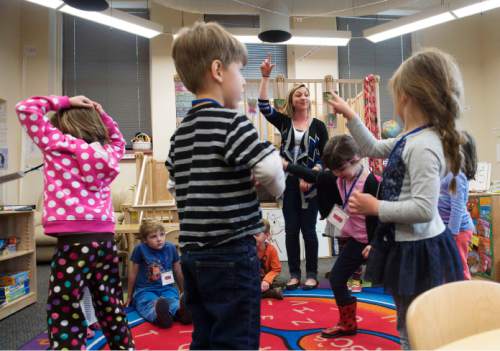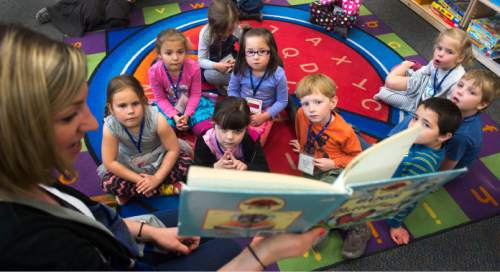This is an archived article that was published on sltrib.com in 2015, and information in the article may be outdated. It is provided only for personal research purposes and may not be reprinted.
Thanks to New Hampshire, Utah doesn't have the smallest percentage of students enrolled in public preschool programs.
But the Beehive State does have the second-smallest percentage, a distinction it shares with Hawaii and neighboring Idaho, according to a report released Tuesday by the U.S. Department of Education.
During the 2012-2013 school year, 87 percent of Utah's 4-year-olds were not enrolled in publicly funded programs to prepare children for kindergarten, according to the report. Nationally, 59 percent of 4-year-olds were not attending public preschool.
"We've made key investments in learning, but we need to do more," Secretary of Education Arne Duncan said in a prepared statement.
In Utah, ideological opposition to public preschool and limited education funding have long combined to stymie the expansion of early-education programs.
But educators say the state is beginning to experience a paradigm shift. School districts no longer see preschool as a budgetary drain and policymakers are warming to the idea of early intervention as a tool to combat the achievement gaps of low-income and at-risk students.
"It works," said Brenda Van Gorder, Granite School District's preschool services director. "Preschool works."
Since 2006, Granite School District has operated a preschool program that is frequently touted as a potential model for statewide implementation. The program is offered tuition-free to low-income families, and serves roughly 3,000 3- and 4-year-old children each year.
Van Gorder said between 20 and 25 percent of the students who enter the program are projected to require special education after entering kindergarten. But to date, with preschool alumni in fifth, sixth, and seventh grades, only 11 students have required special education classes.
"The cost of special education is high," Van Gorder said. "The cost of working with kids up front and being preventative is extremely cost-effective."
Last year, lawmakers approved HB96, a bill by now-House Speaker Greg Hughes, R-Draper, that funds preschool for low-income students through private investments.
Investment firm Goldman Sachs and venture capitalist J.B. Pritzker contributed to the program, opening up 750 seats in public and private programs, with the promise of being paid back with interest if students successfully maintain grade-level proficiency in elementary school.
It's a proportionately small start for the state, but one that many see as a promising first step toward widespread access to early education.
"Utah's public investment in preschool is relatively new," United Way of Salt Lake's Bill Crim said. "I think HB96 was the beginning of that discussion."
Susan Okroy, an early childhood specialist with the Utah Office of Education, said Utah's leaders often act on a belief that young children should be educated in the home. But many parents, particularly low-income and working parents, are not able to provide the kind of in-home educational experiences that children need to prepare for traditional schooling.
"If public preschool was made available I think you'd see huge numbers of people wanting to take advantage of it," Okroy said. "I would like to see every child have an opportunity to have a wonderful preschool experience."
Van Gorder said the first group of HB96 students will enter kindergarten this fall, and if they successfully reach grade-level benchmarks, investors will receive their first payments next year.
If the program proves successful at shrinking achievement gaps, she said, it could provide early-intervention advocates with ammunition for larger state investments and more rapid expansion.
She does not anticipate the state ever implementing mandatory, universal preschool. But the experience of Utah programs shows the benefit of providing families with the option of public preschool, she said.
"It's offered and those who want it come forward," Van Gorder said.





